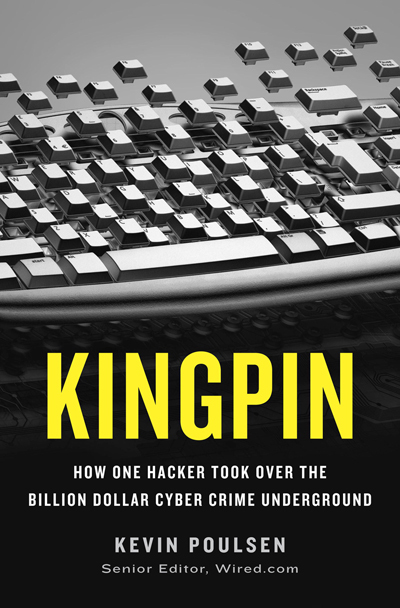Underground carders market. Translation of the book "KingPIN". Chapter 18. "Briefing"
 Kevin Poulsen, editor of the magazine WIRED, and in his childhood blackhat, the hacker Dark Dante, wrote a book about " one of his acquaintances ."
Kevin Poulsen, editor of the magazine WIRED, and in his childhood blackhat, the hacker Dark Dante, wrote a book about " one of his acquaintances ."The book shows the path from a teenager-geek (but at the same time pitching), to a seasoned cyber-pahan, as well as some methods of the work of the special services to catch hackers and carders.
The book translation quest started in the summer in the IT camp for high school students - “ Kingpin: schoolchildren translate a book about hackers ”, then Habrayusers and even a little editorial staff joined the translation.
')
The second breath "quest for the translation of the book" was due to the company Edison .
Chapter 18. Briefing
(for the translation thanks paxapy)In a conference room near Washington, a wall monitor showed two dozen male faces. Some of them frowned at the camera, others smiled for a passport photo. A couple of guys looked like teenagers who had barely reached puberty, others were older, looked untidy and repulsive.
Several FBI agents, in suits and ties, gathered around the table, looking at the faces of the international computer underground. For one of them, many things suddenly filled with meaning.
 At thirty-five, J. Keith Mularski worked for seven years as an FBI agent. But in the computer crimes department he was only four months old and he had a lot to learn. Friendly and with a good sense of humor, Mularsky wanted to become an FBI agent from his first year at Westminster College in Pennsylvania when a bureau recruit came to the classroom for a conversation. He remained in the qualification list even when he had to work in more prosaic positions, from the furniture retailer in Pittsburgh to the operations manager of the national network of furniture stores, with fifty employees subordinate to four stores.
At thirty-five, J. Keith Mularski worked for seven years as an FBI agent. But in the computer crimes department he was only four months old and he had a lot to learn. Friendly and with a good sense of humor, Mularsky wanted to become an FBI agent from his first year at Westminster College in Pennsylvania when a bureau recruit came to the classroom for a conversation. He remained in the qualification list even when he had to work in more prosaic positions, from the furniture retailer in Pittsburgh to the operations manager of the national network of furniture stores, with fifty employees subordinate to four stores.In 1997, after eight years of waiting, he finally decided that he was ready for the FBI. After a year of inspections and sixteen weeks of training at the FBI Academy in Quantico, he was sworn in as an agent in July 1998.
According to one of the bureau's traditions, after the release, the newly minted agents were to number all local offices of the FBI in order of preference for employment. He put the first number to his native Pittsburgh - this was the place where Mularski grew up, went to school and met his wife. His chances of getting there disappeared the next month, when terrorists bombed the US embassies in Kenya and Tanzania. Experienced FBI agents were sent from Washington to investigate and Mularski was one of the fifteen recruits sent to vacancies in the capital, a city that was on his list at number thirty-two.
Pretty soon, Mularsky moved from managing furniture stores to working on some of the most important and significant investigations of the FBI. When in 1999 the transmitter was found in an office on the top floor of the State Department headquarters, he was on the team that discovered a Russian diplomat who was receiving a signal from outside. In 2001, he helped track down Robert Hansen, a counterintelligence agent who had been engaged in espionage for the KGB and the FSB for twenty years.
It was a dizzying job, but the secrecy annoyed Mularsky: his work was completely secret and he could not talk about it with anyone - not even with his wife. So when headquarters began to look for two experienced agents to launch an ambitious initiative in the field of cybercrime in Pittsburgh, he saw a chance to get home and get out of the shadows at the same time. His new job was no longer in the FBI office. He was appointed to a position in the office of a non-profit organization called the National Cyber Forensics and Training Alliance. NCFTA was founded by banks and Internet companies several years earlier to track and analyze frauds against customers, for the most part phishing. Mularsky's work did not consist of parsing individual episodes, since each of them was too small to exceed the FBI threshold of $ 100,000. Instead, he tracked trends in attacks that could lead to the culprit - one or a group of hackers responsible for a large number of cybercrime. Then he sent the result to the local offices of the FBI and in this way he managed to transfer the investigation further.
It was just a collection of information - tedious, but interesting activity. Mularski did not take part in affairs and never received satisfaction from the handcuffs worn on the bad guy. But for the first time in seven years, he could talk to his wife about his work at dinner.
Finally, he returned to the capital for his first briefing on card fraud. At the head of the room was postal inspector Greg Crabb, a dense man with tired eyes who worked at the post office of the international fraudulent department. Crabb got into the criminal realm in 2002 while tracking carding software. Since then, he has been in twenty-five countries, where, working with the local police, he was able to collect a large amount of personal data from members of a growing hacker community: nicknames, IP addresses, correspondence and emails of more than two thousand people. He became the main government expert in this field, but soon his degree of importance began to threaten his security. So he came to the FBI for help.
A briefing for half a dozen FBI agents took place in the inconspicuous Calverton, in the office where the bureau conducted its operation against child pornography. The postal inspector spoke with a mid-western accent, without haste, as if weighing each word as a package, telling the story of the carding scene: “CardersLibrary” spawned “CarderPlanet”, legend of “King Arthur”, influence of Russians and Ukrainians, rise and fall of “Shadowcrew” ". He pulled out a screenshot of CarderPlanet to show the structure of the underground: the operational site was don.
Administrators - "capo". It was a metaphor using intuitive terms for FBI agents: hackers were a new mafia.
Operation “Firewall”, according to Crabb, left the carders in a scattered, paranoid and disorganized position. But they managed to recover. Moreover, now, in the case of “Shadowcrew”, there was no single object for prosecution. Instead, a large number of smaller new forums began to emerge. Crabb did not say this, but the secret services only “injected” half the dose of penicillin to carders: there were more survivors and they became “immune” to such effects.
Mularski was catching every word. For the short time he spent in the NCFTA, he had to work only with raw data that pops up from the underground: links to nicknames, encrypted messages, forums. It all began to converge now. Carders began to organize themselves again. When Crabb finished his talk and the other agents began to gather, Mularski approached the inspector and extended his hand enthusiastically. "It was an exciting material." He said. “I would like to work with you. I would like to be your partner. ”
Crabbe was very surprised by this suggestion. In his experience, much more typical of an FBI agent would be something like “Give me all your information. Thank you, goodbye. ”He met with Mularski and his boss in private for a more thorough presentation of the information available.
Mularsky returned to Pittsburgh, but his thoughts wandered. He thought that he had left behind the world of Russian spies, double agents and perfect secrecy. He was wrong. And his safe measured new work was under great threat.
To be continued
Published translations and publication plan (status as of December 1)
PROLOGUE (GoTo camp students)
1. The Key (Grisha, Sasha, Katya, Alena, Sonya)
2. Deadly Weapons (Young programmers of the Federal Security Service of the Russian Federation, August 23)
3. The Hungry Programmers (Young programmers of the Federal Security Service of the Russian Federation)
4. The White Hat (Sasha K, ShiawasenaHoshi )
5. Cyberwar! ( ShiawasenaHoshi )
6. I Miss Crime (Valentin)
7. Max Vision (Valentine, August 14)
8. Welcome to America (Alexander Ivanov, Aug 16)
9. Opportunities (jellyprol)
10. Chris Aragon (Timur Usmanov)
11. Script's Twenty-Dollar Dumps (Georges)
12. Free Amex! ( Greenhouse social technology )
13. Villa Siena (Lorian_Grace)
14. The Raid (Georges)
15. UBuyWeRush (Ungswar)
16. Operation Firewall (Georges)
17. Pizza and Plastic (done)
18. The Briefing (Georges)
19. Carders Market (Ungswar)
20. The Starlight Room (Ungswar)
21. Master Splyntr (Ungswar)
22. Enemies (Alexander Ivanov)
23. Anglerphish (Georges)
24. Exposure (+)
25. Hostile Takeover (fantom)
26. What's in Your Wallet? (done)
27. Web War One (Lorian_Grace?)
28. Carder Court (drak0sha)
29. One Plat and Six Classics (+)
30. Maksik (+)
31. The Trial (+)
32. The Mall (Shuflin +)
33. Exit Strateg y (done)
34. DarkMarket (Valera aka Dima)
35. Sentencing (comodohacker +)
36. Aftermath (ex-er-sis?)
EPILOGUE
1. The Key (Grisha, Sasha, Katya, Alena, Sonya)
2. Deadly Weapons (Young programmers of the Federal Security Service of the Russian Federation, August 23)
3. The Hungry Programmers (Young programmers of the Federal Security Service of the Russian Federation)
4. The White Hat (Sasha K, ShiawasenaHoshi )
5. Cyberwar! ( ShiawasenaHoshi )
6. I Miss Crime (Valentin)
7. Max Vision (Valentine, August 14)
8. Welcome to America (Alexander Ivanov, Aug 16)
9. Opportunities (jellyprol)
10. Chris Aragon (Timur Usmanov)
11. Script's Twenty-Dollar Dumps (Georges)
12. Free Amex! ( Greenhouse social technology )
13. Villa Siena (Lorian_Grace)
14. The Raid (Georges)
15. UBuyWeRush (Ungswar)
16. Operation Firewall (Georges)
17. Pizza and Plastic (done)
18. The Briefing (Georges)
19. Carders Market (Ungswar)
20. The Starlight Room (Ungswar)
21. Master Splyntr (Ungswar)
22. Enemies (Alexander Ivanov)
23. Anglerphish (Georges)
24. Exposure (+)
25. Hostile Takeover (fantom)
26. What's in Your Wallet? (done)
27. Web War One (Lorian_Grace?)
28. Carder Court (drak0sha)
29. One Plat and Six Classics (+)
30. Maksik (+)
31. The Trial (+)
32. The Mall (Shuflin +)
33. Exit Strateg y (done)
34. DarkMarket (Valera aka Dima)
35. Sentencing (comodohacker +)
36. Aftermath (ex-er-sis?)
EPILOGUE
Source: https://habr.com/ru/post/272073/
All Articles